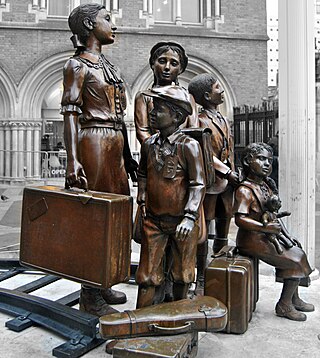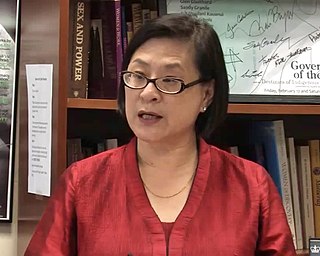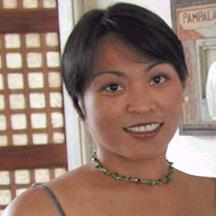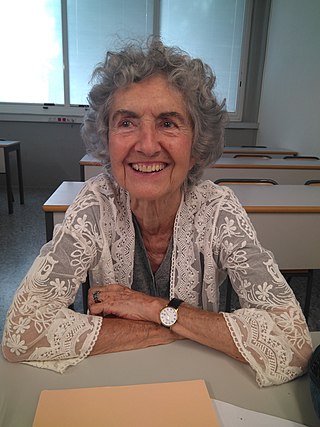
A global city, also known as a power city, world city, alpha city, or world center, is a city that serves as a primary node in the global economic network. The concept originates from geography and urban studies, based on the thesis that globalization has created a hierarchy of strategic geographic locations with varying degrees of influence over finance, trade, and culture worldwide. The global city represents the most complex and significant hub within the international system, characterized by links binding it to other cities that have direct, tangible effects on global socioeconomic affairs.
Transnationalism is a research field and social phenomenon grown out of the heightened interconnectivity between people and the receding economic and social significance of boundaries among nation states.

The sociology of immigration involves the sociological analysis of immigration, particularly with respect to race and ethnicity, social structure, and political policy. Important concepts include assimilation, enculturation, marginalization, multiculturalism, postcolonialism, transnationalism and social cohesion.

Douglas Steven Massey is an American sociologist. Massey is currently a professor of Sociology at the Princeton School of Public and International Affairs at Princeton University and is an adjunct professor of Sociology at the University of Pennsylvania.
David Allan Sonnenfeld is an American sociologist and Professor of Sociology and environmental policy at the State University of New York College of Environmental Science and Forestry, known for his work in the field of ecological modernisation.
Janet Lippman Abu-Lughod was an American sociologist who made major contributions to world-systems theory and urban sociology.
Peggy Levitt is the Mildred Lane Kemper Chair of Sociology at Wellesley College and a co-founder of the Global (De)Centre. Her latest book, Transnational Social Protection: Social Welfare Across National Borders was published by Oxford University Press in 2023. Her current book project, Move Over, Mona Lisa. Move Over, Jane Eyre: Making the World’s Universities, Museums, and Libraries More Welcoming to Everyone will be published by Stanford University Press. Peggy writes regularly about globalization, arts and culture, immigration, and religion.

Mae Ngai is an American historian and Lung Family Professor of Asian American Studies and Professor of History at Columbia University. She focuses on nationalism, citizenship, ethnicity, immigration, and race in 20th-century United States history.
A FIRE economy is any economy based primarily on the finance, insurance, and real estate sectors. Finance, insurance, and real estate are United States Census Bureau classifications. Barry Popik describes some early uses as far back as 1982. Since 2008, the term has been commonly used by Michael Hudson and Eric Janszen. It is New York City's largest industry and a prominent part of the service industry in the United States overall economy and other Western developed countries.
Postnationalism or non-nationalism is the process or trend by which nation states and national identities lose their importance relative to cross-nation and self-organized or supranational and global entities as well as local entities. Although postnationalism is not strictly considered the antonym of nationalism, the two terms and their associated assumptions are antithetic as postnationalism is an internationalistic process. There are several factors that contribute to aspects of postnationalism, including economic, political, and cultural elements. Increasing globalization of economic factors have shifted emphasis from national economies to global ones.
The transnational capitalist class (TCC), also known as the transnational capitalist network (TCN), in neo-Gramscian and Marxian-influenced analyses of international political economy and globalization, is the global social stratum that controls supranational instruments of the global economy such as transnational corporations and heavily influences political organs such as the World Trade Organization.

Rhacel Salazar Parreñas is Doris Stevens Professor of Sociology and Gender and Sexuality Studies at Princeton University. She previously taught at the University of Southern California, Brown University, the University of California, Davis and the University of Wisconsin–Madison. Her research has been featured in NPR's "The World", Bloomberg News, The New York Times, the Wall Street Journal, de Volkskrant, and the American Prospect. Parreñas has written five monographs, co-edited three anthologies, and published a number of peer-reviewed articles.

Lourdes Benería is a Spanish–American economist. She was Professor Emerita at Cornell University's Department of City and Regional Planning. The author and editor of many books and articles, her work has concentrated on topics having to do with labor economics, women's work, the informal economy, Gender and development, Latin American Development and globalization. Before Cornell, she taught at Rutgers University and has given courses in other international centers. She worked at the ILO for two years and has collaborated with other UN organizations, such as UNIFEM and UNDP, and with several NGOs. She obtained her PhD at Columbia University in 1975.
Migration studies is the academic study of human migration. Migration studies is an interdisciplinary field which draws on anthropology, prehistory, history, economics, law, sociology and postcolonial studies.
Sarah J. Mahler is an American author and cultural anthropologist. She was part of a group of anthropologists attempting to change migration studies to a more comprehensive way to understand how migrants crossing international borders remain tied to their homelands and how cultural practices and identities reflect influences from past and present contexts, called "transnational migration."

The following outline is provided as an overview of and topical guide to the broad, interdisciplinary subject of globalization:
In social science, methodological nationalism is an intellectual orientation and pattern in scholarly research that conceives of the nation-state as the sole unit of analysis or as a container for social processes. This concept has largely been developed by Andreas Wimmer and Nina Glick Schiller, who specifically define it as "the assumption that the nation/state/society is the natural social and political form of the modern world". Methodological nationalism has been identified in many social science subfields, such as anthropology, sociology, and the interdisciplinary field of migration studies. Methodological Nationalism, as a practice within Social Science, has been further critiqued by scholars such as Saskia Sassen, who contends that the nation-state and its borders are an insufficient unit of analysis and that the national is at times the "terrains of the global".
Donna Rae Gabaccia is an American historian who studies international migration, with an emphasis on cultural exchange, such as food and from a gendered perspective. From 2003 to 2005 she was the Andrew Mellon Professor of History at the University of Pittsburgh and from 2005 to 2012 she held the Rudolph J. Vecoli Chair of Immigration History at the University of Minnesota. During the same period, she was the director of the Immigration History Research Center at the University of Minnesota. In 2013, her book, Foreign Relations: Global Perspectives on American Immigration won the Immigration and Ethnic History Society's Theodore Saloutos Prize in 2013.

Patricia Fernández-Kelly is a social anthropologist, academic and researcher. She is Professor of Sociology and Research Associate at the Office of Population Research at Princeton University. She is also the director of the Princeton Center for Migration and Development, associate director of the Program in American Studies, and Chair of the Board at the Latin American Legal Defense and Education Fund (LALDEF).

Madeline Y. Hsu is an American historian known for her scholarship in Chinese American and Asian American history. She is the director of the Center for Global Migration Studies at the University of Maryland and is an elected Fellow of the Society of American Historians. She is the eldest granddaughter of the neo-Confucian scholar Xu Fuguan.










